现在完成时语法详细讲解
- 格式:docx
- 大小:79.16 KB
- 文档页数:5
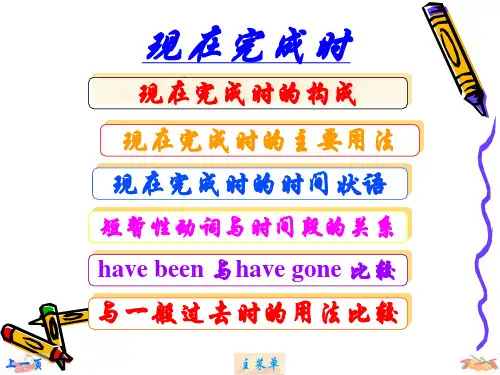


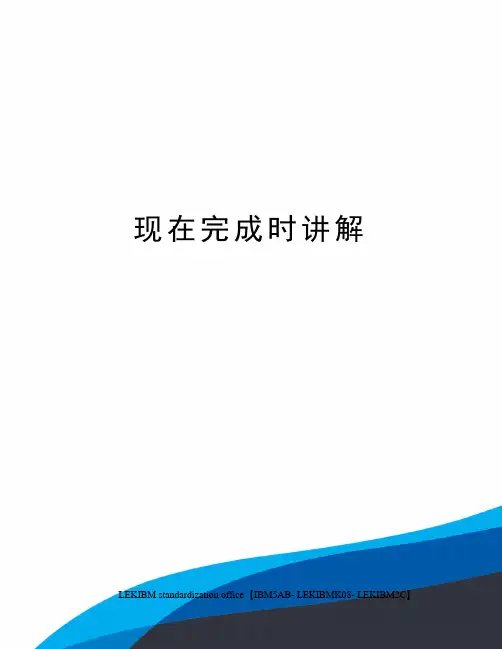
现在完成时讲解LEKIBM standardization office【IBM5AB- LEKIBMK08- LEKIBM2C】现在完成时讲解一.基本结构:助动词have/has+过去分词(done)二.句型:否定句:主语+have/has+not+过去分词+其他. 一般疑问句:Have/Has+主语+过去分词+其他. 简略答语: Yes, 主语 + have/has.(肯定) No, 主语 + haven't/hasn't.(否定)三.用法(1)现在完成时表示过去发生或已经完成的动作对现在造成的影响或结果I have spent all of my money (so far).(含义是:现在我没有钱花了.)Guo zijun has (just/already) come. (含义:郭子君现在在这儿)My father has gone to work.(含义是:我爸爸现在不在这儿)(2)现在完成时可以用来表示发生在过去某一时刻的,持续到现在的动作(用行为动词表示)或状态(be动词表示)常与for(+时间段),since(+时间点或过去时的句子)连用.①for+时段②since+过去一个时间点(译为:自从……以来)③since+时段+ago④since+从句(过去时)⑤It is+时段+since+从句(过去时)Mary has been ill for three days.I have lived here since 1998.四.has gone (to),has been (to), has been (in) 的区别Have/Has gone(to) :去了(现在不在说话现场)Where is your father?He has gone to Shanghai.Have/Has been (to) :去过(已不在去过的地方)My father has been to Shanghai.Have/has been in:呆了多久(还在所呆的地方)My father has been in Shanghai for two months. /since two months ago.五.现在完成时的标志1.现在完成时的含义之一是过去完成的动作对现在仍有影响,用以下四大标志词可以表达这种含义:* 以already, just和yet为标志He has already got her help.他已得到她的帮助。

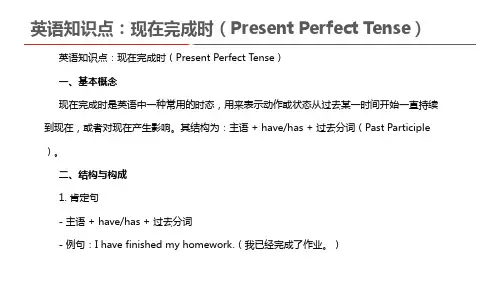
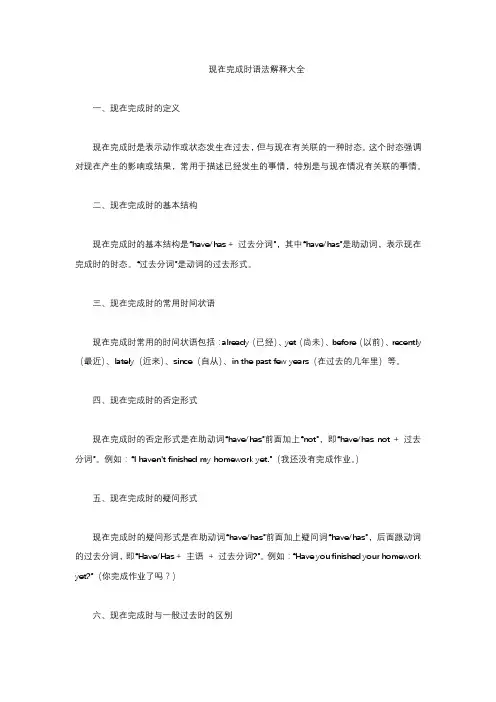
现在完成时语法解释大全一、现在完成时的定义现在完成时是表示动作或状态发生在过去,但与现在有关联的一种时态。
这个时态强调对现在产生的影响或结果,常用于描述已经发生的事情,特别是与现在情况有关联的事情。
二、现在完成时的基本结构现在完成时的基本结构是“have/has + 过去分词”,其中“have/has”是助动词,表示现在完成时的时态。
“过去分词”是动词的过去形式。
三、现在完成时的常用时间状语现在完成时常用的时间状语包括:already(已经)、yet(尚未)、before(以前)、recently (最近)、lately(近来)、since(自从)、in the past few years(在过去的几年里)等。
四、现在完成时的否定形式现在完成时的否定形式是在助动词“have/has”前面加上“not”,即“have/has not + 过去分词”。
例如:“I haven't finished my homework yet.”(我还没有完成作业。
)五、现在完成时的疑问形式现在完成时的疑问形式是在助动词“ha ve/has”前面加上疑问词“have/has”,后面跟动词的过去分词,即“Have/Has + 主语+ 过去分词?”。
例如:“Have you finished your homework yet?”(你完成作业了吗?)六、现在完成时与一般过去时的区别现在完成时与一般过去时都表示过去发生的动作或状态,但它们的重点不同。
现在完成时强调对现在的影响或结果,而一般过去时只是简单地描述过去发生的事情,不涉及现在的状态。
例如:“I finished my homework an hour ago.”(我一小时前完成了作业。
)(用一般过去时)和“I have finished my homework now.”(我已经完成了作业。
)用现在完成时则强调现在不需要做作业了,对现在的情况产生了影响。
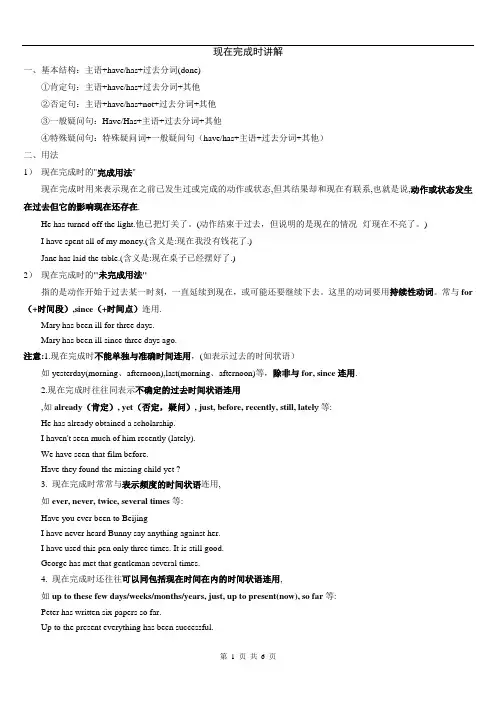
现在完成时讲解一、基本结构:主语+have/has+过去分词(done)①肯定句:主语+have/has+过去分词+其他②否定句:主语+have/has+not+过去分词+其他③一般疑问句:Have/Has+主语+过去分词+其他④特殊疑问句:特殊疑问词+一般疑问句(have/has+主语+过去分词+其他)二、用法1)现在完成时的"完成用法"现在完成时用来表示现在之前已发生过或完成的动作或状态,但其结果却和现在有联系,也就是说,动作或状态发生在过去但它的影响现在还存在.He has turned off the light.他已把灯关了。
(动作结束于过去,但说明的是现在的情况--灯现在不亮了。
)I have spent all of my money.(含义是:现在我没有钱花了.)Jane has laid the table.(含义是:现在桌子已经摆好了.)2)现在完成时的"未完成用法"指的是动作开始于过去某一时刻,一直延续到现在,或可能还要继续下去。
这里的动词要用持续性动词。
常与for (+时间段),since(+时间点)连用.Mary has been ill for three days.Mary has been ill since three days ago.注意:1.现在完成时不能单独与准确时间连用,(如表示过去的时间状语)如yesterday(morning、afternoon),last(morning、afternoon)等,除非与for, since连用.2.现在完成时往往同表示不确定的过去时间状语连用,如already(肯定), yet(否定,疑问), just, before, recently, still, latel y等:He has already obtained a scholarship.I haven't seen much of him recently (lately).We have seen that film before.Have they found the missing child yet ?3. 现在完成时常常与表示频度的时间状语连用,如ever, never, twice, several times等:Have you ever been to BeijingI have never heard Bunny say anything against her.I have used this pen only three times. It is still good.George has met that gentleman several times.4. 现在完成时还往往可以同包括现在时间在内的时间状语连用,如up to these few days/weeks/months/years, just, up to present(now), so far等:Peter has written six papers so far.Up to the present everything has been successful.5. 现在完成时还可以用来表示过去的一个时间到现在这段时间内重复发生的动作.We have had four texts this semester.6. have been to 和have gone to的区别have been to 强调“去过”,现已不在那里,如:He has been to the USA three times.他到美国去过三次。
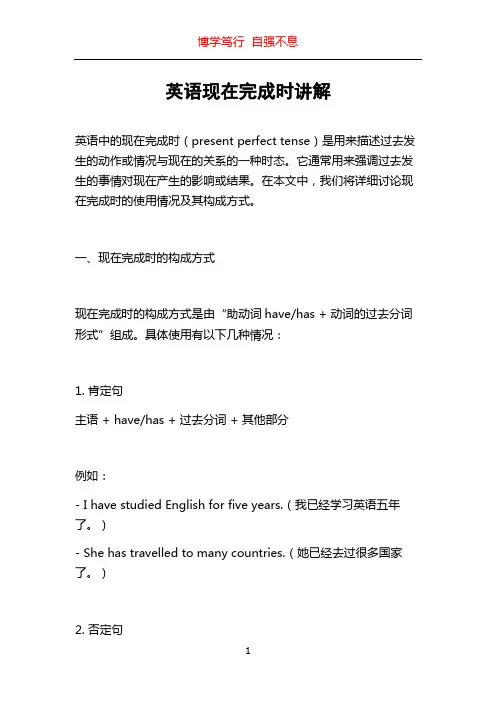
英语现在完成时讲解英语中的现在完成时(present perfect tense)是用来描述过去发生的动作或情况与现在的关系的一种时态。
它通常用来强调过去发生的事情对现在产生的影响或结果。
在本文中,我们将详细讨论现在完成时的使用情况及其构成方式。
一、现在完成时的构成方式现在完成时的构成方式是由“助动词have/has + 动词的过去分词形式”组成。
具体使用有以下几种情况:1. 肯定句主语 + have/has + 过去分词 + 其他部分例如:- I have studied English for five years.(我已经学习英语五年了。
)- She has travelled to many countries.(她已经去过很多国家了。
)2. 否定句主语 + have/has + not + 过去分词 + 其他部分例如:- He hasn't finished his work yet.(他还没有完成工作。
)- We haven't seen each other for a long time.(我们已经很久没有见面了。
)3. 疑问句Have/Has + 主语 + 过去分词 + 其他部分?例如:- Have you ever visited Paris?(你曾经去过巴黎吗?)- Has she seen the latest movie?(她看过最新的电影吗?)二、现在完成时的使用情况现在完成时通常用于以下几种情况:1. 表示过去开始的动作一直延续至今或刚刚结束的情况。
例如:- I have lived in this city for ten years.(我在这个城市已经住了十年了。
)- They have worked on this project since last month.(他们从上个月开始就一直在做这个项目。
)2. 表示过去发生的动作对现在产生的影响或结果。
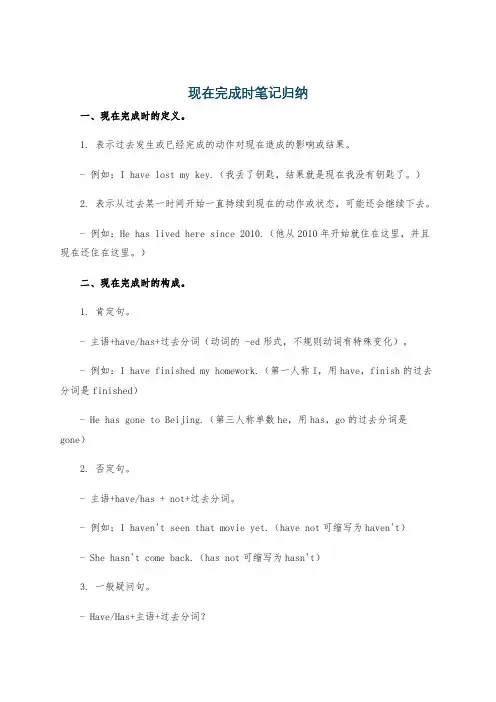
现在完成时笔记归纳一、现在完成时的定义。
1. 表示过去发生或已经完成的动作对现在造成的影响或结果。
- 例如:I have lost my key.(我丢了钥匙,结果就是现在我没有钥匙了。
)2. 表示从过去某一时间开始一直持续到现在的动作或状态,可能还会继续下去。
- 例如:He has lived here since 2010.(他从2010年开始就住在这里,并且现在还住在这里。
)二、现在完成时的构成。
1. 肯定句。
- 主语+have/has+过去分词(动词的 -ed形式,不规则动词有特殊变化)。
- 例如:I have finished my homework.(第一人称I,用have,finish的过去分词是finished)- He has gone to Beijing.(第三人称单数he,用has,go的过去分词是gone)2. 否定句。
- 主语+have/has + not+过去分词。
- 例如:I haven't seen that movie yet.(have not可缩写为haven't)- She hasn't come back.(has not可缩写为hasn't)3. 一般疑问句。
- Have/Has+主语+过去分词?- 例如:Have you read this book?(回答:Yes, I have. / No, I haven't.)- Has he eaten lunch?(回答:Yes, he has. / No, he hasn't.)三、现在完成时的标志词。
1. already(已经)- 通常用于肯定句中,位于助动词have/has和过去分词之间。
- 例如:I have already finished my work.2. yet(还,仍然)- 用于否定句和疑问句中,通常位于句末。
- 例如:I haven't seen the movie yet. Have you found your pen yet?3. just(刚刚)- 位于助动词have/has和过去分词之间。
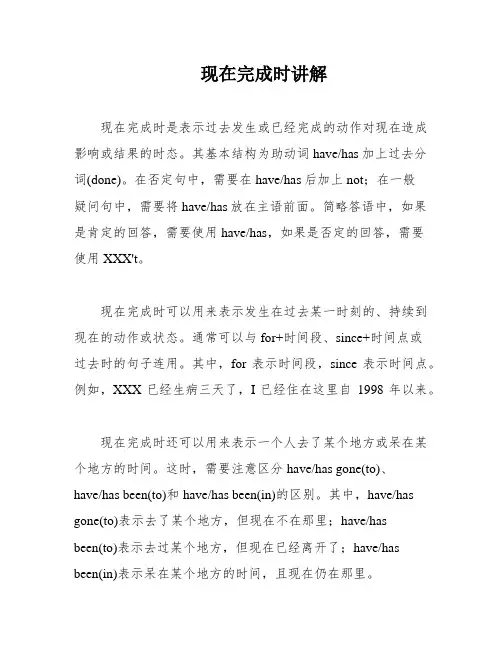
现在完成时讲解现在完成时是表示过去发生或已经完成的动作对现在造成影响或结果的时态。
其基本结构为助动词have/has加上过去分词(done)。
在否定句中,需要在have/has后加上not;在一般疑问句中,需要将have/has放在主语前面。
简略答语中,如果是肯定的回答,需要使用have/has,如果是否定的回答,需要使用XXX't。
现在完成时可以用来表示发生在过去某一时刻的、持续到现在的动作或状态。
通常可以与for+时间段、since+时间点或过去时的句子连用。
其中,for表示时间段,since表示时间点。
例如,XXX已经生病三天了,I已经住在这里自1998年以来。
现在完成时还可以用来表示一个人去了某个地方或呆在某个地方的时间。
这时,需要注意区分have/has gone(to)、have/has been(to)和have/has been(in)的区别。
其中,have/has gone(to)表示去了某个地方,但现在不在那里;have/hasbeen(to)表示去过某个地方,但现在已经离开了;have/hasbeen(in)表示呆在某个地方的时间,且现在仍在那里。
现在完成时的标志词有already、just和yet等。
这些标志词可以表达过去完成的动作对现在仍有影响的含义。
例如,XXX已经得到了她的帮助。
XXX。
XXX.This is the best movie I have ever seen.He has never visited Beijing before.XXX to the USA three times.He has made it to Beijing so far.XXX.XXX in the past and are still ongoing。
we use the present perfect tense with "for" and "since" to distinguish een the n of the n and the point in time。
现在完成时知识点归纳总结现在完成时是英语中一个重要的时态,用于表示过去发生的动作或事情对现在产生的影响或结果。
下面是对现在完成时的知识点进行归纳总结:一、现在完成时的构成现在完成时的构成由“助动词have/has + 过去分词形式的动词”组成,其中have用于第一人称(I, we)以及第二人称(you),has用于第三人称单数(he, she, it)。
1. 肯定句的构成:主语 + have/has + 过去分词形式的动词例如:- I have studied English for three years.- He has finished his homework.2. 否定句的构成:主语 + have/has + not + 过去分词形式的动词例如:- She hasn't visited London yet.- We haven't seen the movie.3. 疑问句的构成:Have/Has + 主语 + 过去分词形式的动词 + 其他?例如:- Have you ever traveled abroad?- Has she lived in this city before?二、现在完成时的用法1. 表示过去的行动或事件对现在的影响或结果。
例如:- She has lost her keys. (她现在找不到她的钥匙。
)- He has worked hard, so he is tired. (他过去努力工作,所以他现在很累。
)2. 表示从过去某个时间开始一直持续到现在的动作或状态。
例如:- They have lived in the same house for 10 years. (他们从10年前开始就一直住在同一栋房子里。
)- I have known him since we were kids. (我从我们还是孩子的时候就认识他了。
)3. 表示过去经历的事情或已经完成的动作。
完整版)现在完成时的用法详解现在完成时是英语中的一种时态,表示动作或状态已经发生,对现在产生影响或有关联。
下面是现在完成时的用法详解:一、构成和用法:现在完成时由助动词“have/has”加上动词的过去分词构成。
下面是不同人称的构成方式:I/we/you/they + have + 过去分词He/she/it + has + 过去分词现在完成时的用法包括以下几个方面:1.表示过去发生的动作对现在产生的影响或结果:I have ___(我已经完成作业了)2.表示过去开始的动作一直延续到现在并可能继续下去:She has lived in New York for five years.(她在纽约已经住了五年了)3.表示经历过的经历或动作:Have you ever been to Paris?(你去过巴黎吗?)4.表示已完成的动作或状态:They have already left.(他们已经走了)二、使用注意事项:使用现在完成时需要注意以下几点:1.不能和过去时间状语连用:He has already left yesterday.(错误)应改为He left yesterday.(正确)2.不能和表示过去具体的时间连用:I have seen her last night.(错误)应改为I saw her last night.(正确)3.可以和表明时间段的时间状语连用:I have lived here for three years.(我在这里住了三年了)4.可以和表示过去到现在一段时间的时间状语连用:I have known him since 2010.(从2010年起我就认识他)以上就是现在完成时的用法详解,希望对你有帮助。
现在完成时(一)定义:表示到现在为止发生过的动作或状态,也可表示过去已经开始,一直延续到现在的动作或状态;强调过去与现在之间的联系。
(二)构成(即谓语动词形式):助动词have/has+P.P.(过去分词)当主语是第三人称单数时,由has+过去分词构成;当主语是非三人称单数时,由have+过去分词构成。
例如:I have been to Beijing three times. (主语是非三人称单数)He has been to Beijing three times. (主语是三人称单数)(三)句型转换1、否定句:助动词have/has+not+ P.P.(过去分词)构成分别缩写为:haven’t+ P.P.或hasn’t+ P.P.例如:I haven’t been to Beijing three times.He hasn’t been to Beijing three times.2、一般疑问句:Have/Has+主语+ P.P.(过去分词)+其他成分?肯定回答:Yse, ~have/has. 否定回答:No, ~haven’t/hasn’t.例如:Have you been to Beijing three times?Yes, I have. / No, I haven’t.Has he been to Beijing three times?Yes, he has. / No, he hasn’t.(四)基本用法1、过去发生或已完成的某个动作对现在产生的影响或结果,强调的是这个影响或结果。
<又叫“完成用法”>常同already, just, yet等时间状语连用例如:I have just turned off the light. 我刚刚把灯关上。
(结果是灯已经关上了)She has lost her bike.她把自行车丢了。
(影响是他现在没有自行车骑了)The rain has stopped now.雨已经停了。
现在完成时讲解一、现在完成时的构成(一)肯定式主语+助动词have /has +过去分词+其它说明:这里的have /has是助动词,没有什么具体意义。
当主语是第三人称单数时助动词用has,其余人称一律用have。
has,have的缩略式分别为's或've。
规则动词过去分词的构成与过去式的构成方式一样,不规则动词可参看不规则动词表。
实例:1)I've just copied all the new words .我刚抄写了所有的生词。
(表示不要再抄了)2)She has lost her books .她丢失了她的书。
(表示到目前为止还没有找到)3)We've just cleaned the classroom .我们刚好打扫了教室。
(表明现在教室是干净的)补充:规则动词过去分词变化规则:1)一般直接在词尾加上-ed。
如: look- looked post -posted2) 以e结尾的动词,直接加-d。
如: move- moved3) 辅音字母+y结尾,变y为i再加-ed如:carry-carried4) 重读闭音节单词需双写末尾辅音字母。
如:stop-stopped; plan- planned(二)否定式主语+助动词have /has+not+过去分词+其它说明:现在完成时构成否定句时,只需在助动词have /has后面加not就行。
have not,has not的缩略式分别为haven't ,hasn't。
另外,肯定句中有some,already时,改为否定时要分别改成any,yet。
实例:1)I haven't finished my homework yet.我还没有完成我的作业。
2)She hasn't travelled on a train .她没有坐火车旅行过。
3)We have never spoken to a foreigner.我们从来没有和外国人说过话。
现在完成时知识点现在完成时是英语中的一种时态,用来描述已经发生的动作或已经完成的状态。
在现在完成时中,动词的形式由“have/has + 过去分词”构成。
下面将介绍现在完成时的相关知识点。
一、现在完成时的构成现在完成时的肯定句结构为:“主语+ have/has + 过去分词”。
其中,当主语为第一人称单数(I)时,使用have;当主语为第三人称单数(he/she/it)或复数时,使用has。
过去分词的构成方式有规则变化和不规则变化。
1. 规则变化的过去分词规则变化的过去分词是指动词的过去式和过去分词形式相同,通常在动词原形后加-ed。
如:play-played, work-worked。
2. 不规则变化的过去分词不规则变化的过去分词是指动词的过去式和过去分词形式不同,需要通过记忆。
如:go-gone, eat-eaten。
二、现在完成时的用法现在完成时主要用来表示过去发生的动作对现在造成的影响或结果。
具体用法如下:1. 表示过去发生的动作对现在造成的影响例如:- I have lost my keys.(我丢了钥匙。
)- She has broken her leg.(她摔断了腿。
)2. 表示过去已完成的动作对现在造成的结果例如:- They have finished their homework.(他们已经完成了作业。
)- He has bought a new car.(他买了一辆新车。
)3. 表示过去开始的动作一直持续到现在例如:- I have known her for five years.(我认识她已经五年了。
)- He has worked in this company since 2010.(他从2010年开始在这家公司工作。
)4. 表示过去发生的动作在过去某个时间点之前已经完成例如:- I had read the book before the movie came out.(在电影上映之前,我已经读过这本书了。
肯定、疑问、否定
肯定句
还疑问句、否定
最近肯定、否定、疑问句
几次
用法一:表示过去发生或已经完成的某一动作对现在造成的影响或结果。
常与just(刚刚),already(已经),never(从来没有),ever(曾经),before(以前),yet(仍然),once(一次),twice(两次),many times (很多次),how many times(多少次),so far(迄今为止),during the past(last)three years(最近三年来)等连用。
※副词的位置:①just常用于肯定句中,放在have / has后,He has just come .
②never表示否定, 放在have / has后, He has never visited the Great Wall.
③ever用于疑问句中,句型为: Have / Has+主语+ever +过去分词?“…曾经……过吗?”用于询问某人过去的经历。
Have you ever been to the farm?
④before用于句末,The woman has never heard of that before.
⑤yet 用于句末或not 之后.Has the train arrived yet? No, not yet.
⑥already用于肯定句, have / has 之后或句末.We have already finished it.
⑦so far用于句首或句末. So far, we have visited the moon.
用法二:表示过去已经开始,一直延续到现在的动作或状态。
时间状语有:
①for+表示一段时间的词语I have taught English for 19 years。
②since+表示过去时间点的词语He has been at this school since 1986.
③since+表示过去的时间状语从句I have lived here since I was born.
2 ④since+一段时间+ago. I have known him since 20 years ago.
三、现在完成时态中可以和表示一段时间状语(for,since,how long, all one’s life)连用的动词必须是表示延
续的情况或动作的动词,即延续性动词。
如:be,have,know,live,work,study,learn,teach,keep,speak,talk,draw,wait,wear,walk,sleep,drive,write,do,clean等。
I have been a teacher for nearly 20 years. How long has he lived here?
英语中还有一些动词的意义决定它们所表示的动作不能延续,只是一瞬间
就结束的动作,这类动词叫做“非延续性动词”,常见的有:come,go,arrive,reach,see,hear,close,open,leave,begin,start,lose,buy,fall,join,die,get up,become,borrow,lend,find,finish,receive等。
这
些动词可用于现在完成时,说明某个动作的结果还存在,但不能和表示一段时间的状语(how long,for,since)
连用。
He has come back.(√)He has come back for two hours.(×)
※但在否定句中,非延续性动词也可用表示一段时间的状语来修饰,如
I haven’t heard from my father for a long time. We haven’t seen him since 1999.
(5)用相应的延续性动词替代非延续性动词。
He has bought the book for two weeks. 改为:He has had the book for two weeks.
常见的相应转换形式如下:
borrow / lend→keep, buy→have, finish / end→be over,
arrive /come / go / move / reach /get to→be in /at / be here /be there,
begin / start→be on , open→be open , close→be closed,die→be dead ,
leave→be away(from), go to school→be in school / be a stu dent,
getup→be up, fall asleep→be asleep , fall ill→be ill, get to know→know,
lose→be lost,become→be, return / come back / get back→be back,
join→be in / be a…member, join the army→be in the army /be a soldier,
receive / get a letter→have a letter , catch / get a cold→have a cold,
begin to study→study,
他参军已有三年.He has joined the army for three years.(错)改为:
He has been in the army for three years / since three years ago.
He has been a soldier for three years / since three years ago.
He joined the army three years ago.
It is three years since he joined the army.
Three years has passed since he joined the army.
四、现在完成时中应注意的几个问题
3 have been to 和have gone to的区别
have been to 强调“去过”,现已不在那里,如:
He has been to the USA three times.
他到美国去过三次。
(过去“到美国”,现在已“不在美国”)
have gone to主要强调的是“去了”,现在人不在说话的现场,如:
--Where's your mother? --你妈妈在哪?
--She has gone to the hospital. --她去医院了。
五、如何通过与一般过去时做比较,进一步掌握现在完成时?
一般过去时和现在完成时的动作都发生在过去,但意义却不同.
(1)一般过去时只表示过去的动作或状态,和现在不发生关系。
现在完成时表示过去发生的某一动作对现在造成的影响,强调的是现在。
如:I learned ten English songs(说明过去学过,现在是否记得,不是本句的内容)
I have learnt ten English songs.(learn发生在过去,但强调我现在懂英语歌曲)
I cleaned the blackboard half an hour ago.(只说明“擦”和其发生的时间)
I have cleaned the blackboard.(说明现在黑板是干净的)
The teacher has written some new words on the blackboard(黑板上现在有单词)
The teacher wrote some new words on the blackboard(黑板上现在没有单词)
(2)一般过去时可以和表示过去的时间状语连用,如:yesterday, last year, three days ago, just now, 等。
现在完
成时不能和表示过去的时间状语连用,其时间状语可以是since…,for… , just, ever, never, bef ore, already, yet , so far, all one’s life等
4。